Newsletter
Weibo Watch: Ghost Scales
From national pride to social distrust, these are the most noteworthy trends and topics dominating Chinese social media recently.
Published
1 year agoon

PREMIUM NEWSLETTER | ISSUE #18
This week’s newsletter:
◼︎ 1. Editor’s Note – Ghost Scales
◼︎ 2. What’s Featured – A closer look at the featured stories
◼︎ 3. What More to Know – Highlighting 8 hot topics
◼︎ 4. What Lies Behind – Observations beyond the headlines, by Miranda Barnes
◼︎ 5. What’s Noteworthy – Lu Xun turning in his grave?
◼︎ 6. What’s Popular – China’s very own ‘pride walk’
◼︎ 7. What’s Memorable – The school in Changzhou that made students ill
◼︎ 8. Weibo Word of the Week – “Toxic Fangirling”, by Ruixin Zhang
Dear Reader,
‘Ghost scales’ have been all the talk on Weibo lately. The term, guǐ chèng (鬼秤), refers to inaccurate scales used to cheat customers by providing less than the actual quantity for the price paid.
The topic of ghost scales came up when a well-known Chinese blogger recently exposed how many sellers in Dalian markets were actually using deceptive weighing scales, duping ordinary customers buying their vegetables, fruit, or seafood. On Weibo alone, one related hashtag page garnered nearly 250 million views.
Despite local authorities stepping up to investigate and punish fraudulent sellers tampering with scales, the incident ignited anger beyond Dalian. People questioned why it took an internet influencer to advocate for consumer rights and why there aren’t better regulations in place to combat fraud. Rather than blaming the fraudulent sellers, online anger was mostly directed at the systems allowing them to operate.
The ghost scale story does not stand by itself. Much smaller stories have gone viral before, such as the customer who discovered that the 200g of tripe he ordered for 72rmb ($11) at a local Haidilao restaurant was actually only 138g. A related hashtag received over 260 million views on Weibo in 2021. “Next time I’m bringing my own scale,” some commenters replied.

The vlogger, superB太, exposing the fraudulent scales in Dalian.
Is it much ado about nothing? Not really. Although the stories differ, the common theme behind many of these online discussions is distrust. Recently, various topics highlighting low societal trust have trended.
One revolved around the Heilongjiang gym collapse. Three Chinese middle school students died in November when their gymnasium roof collapsed after heavy snowfall. It was the second gym collapse incident in the province this year. Netizens argued that better inspections, quality checks, and stricter public safety regulations could have prevented the tragedy.
Another example is the recent controversy about fake birthing certificates being sold by a hospital in Xiangyang for use by human trafficking brokers. The head of the hospital and five others were soon detained after the story, exposed by a Chinese investigative vlogger, went viral. Many questioned how such a thing could still happen in 2023.
The recurring idea in these online discussions is that existing constructions at various levels in Chinese society allow such practices to happen, with people supposedly covering for each other and turning a blind eye during inspections. While a market might have actual ‘ghost scales,’ similar deceptive operations could occur at a hospital management level, at a construction site, or within a coal mine company.
A few years ago, the development of China’s Social Credit System was often portrayed as a gloomy sci-fi storyline by many Western media outlets. Even today, there are many people who think that China has a system in place as depicted in the American Black Mirror series, which shows a dystopian society where people are judged by a numeric rating given to them by their interactions with other people.
Many people and media outlets not only misunderstood the Chinese ‘Social Credit System’; they also overlooked the historical, social, and culturally rooted factors that play a crucial role in understanding how such a system, designed to enhance societal trust, could actually be embraced. (For accurate and nuanced perspectives on the social credit system, Vincent Brussee has just published a new book that delves into these complexities.)

In the Black Mirror episode ‘Nosedive’, people’s position on the social ladder is determined by other people ranking them.
In making a distinction between ‘high-trust societies’ and ‘low-trust societies,’ Francis Fukuyama (1995) classified China as a ‘low trust society,’ where people have very little trust in people outside their family or close groups. Though not everyone agrees with Fukuyama, the idea of being cheated or becoming a victim of fraudulent practices regularly trends on China’s internet. Small incidents represent more significant issues.
After the Dalian ghost scale incident went viral, multiple people took the initiative to test scales in their own neighborhoods. A student from Henan University, a livestreamer from Shenyang, a reporter from Nanchang—each contributed to exposing local street vendors or restaurant owners using ghost scales to cheat customers.
The domino effect of ghost scales being exposed demonstrates the powerful dynamic of Chinese social media. Untrustworthy individuals lacking integrity can be swiftly exposed, and their fraudulent businesses crumble within hours. Chinese influencers, vloggers, and commentators play a major role in addressing various social issues, from scamming sellers to corrupt doctors, and actually make a change.
Some netizens recently commented that their local market sellers would not dare to use ghost scales anymore. In the meantime, however, while the fight for consumer rights and social injustice continues, it could never hurt to bring your own trustworthy scale.
Miranda Barnes and Ruixin Zhang have contributed to this week’s newsletter.
Best,
Manya (@manyapan)
* Francis Fukuyama. 1995. Trust: The Social Virtues and the Creation of Prosperity. New York: Free Press
What’s Trending
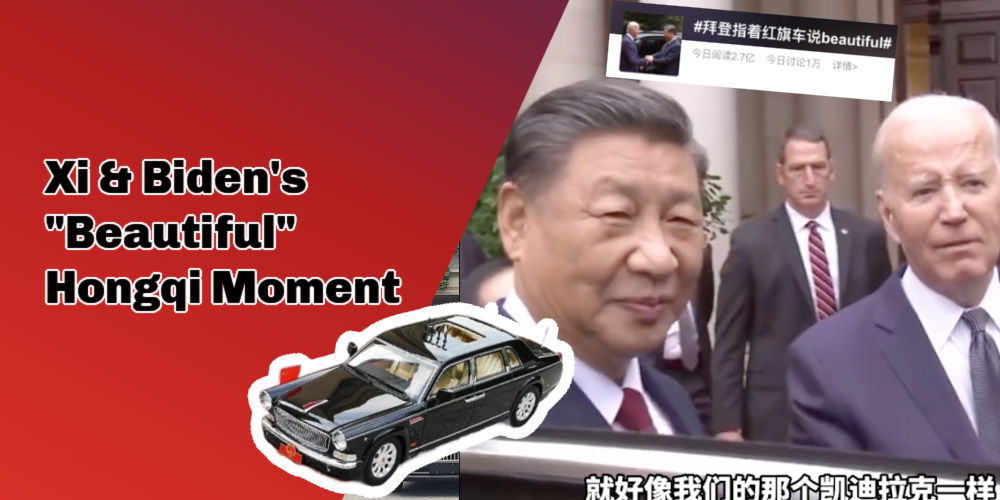
1: National Pride and Shifting Dynamics in Sino-American Relations | The Xi-Biden meeting was one of the biggest topics of the week. After the much anticipated face-to-face talk in California, one noteworthy detail quickly hit Weibo’s top trending topics, namely Biden’s apparent admiration for Xi Jinping’s Hongqi car. The recognition of the decades-old Chinese Hongqi brand by a U.S. president was a promotion-worthy moment for Chinese official channels, resonating with netizens.
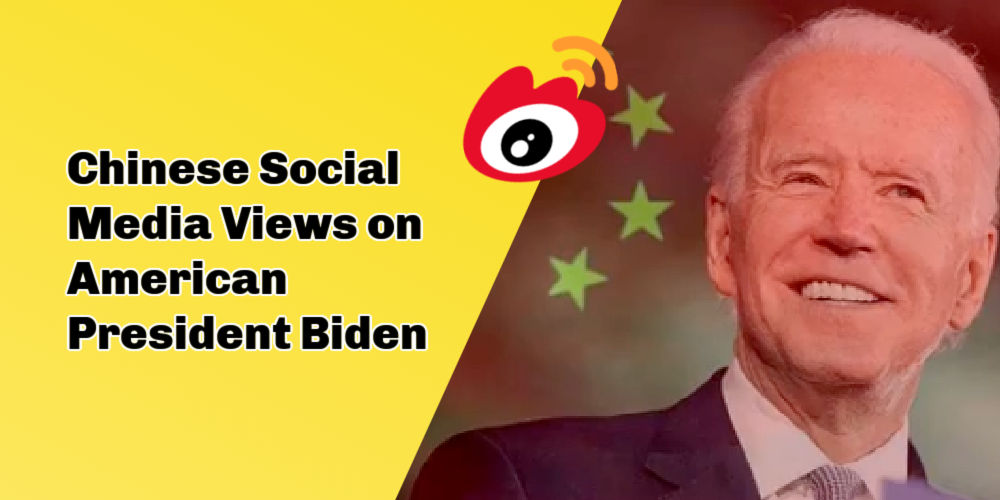
2: ‘Sleepy Joe’ and ‘Revive the Country’ Biden | From positive portrayals by official channels to online banter and critical voices discussing Biden’s global policies and his health, there are various sentiments on Chinese social media surrounding US President Joe Biden. At a time when anti-American sentiments are on the rise, some netizens view Biden as embodying the negative stereotypes prevalent on social media about the United States or the Western world in general. But in the days leading up the Xi-Biden meeting Chinese official channels are promoting more positive portrayals of the U.S. leader.

3: The Sun-Yat Sen Hospital Controversy | Several medical workers who all worked at the same renowned oncology lab in Guangzhou recently were diagnosed with cancer. Although there are many concerns about whether or not their cancer is related to their working environment, the primary source of public outrage revolves around the handling of the controversy by the affiliated hospital.

4: Douyin Introduces Paywalls | The introduction of a Douyin novel feature, that would enable content creators to impose a fee for accessing their short video content, has sparked discussions across Chinese social media. Although the feature would benefit creators, many Douyin users are skeptical. Would this be a new beginning for the Chinese TikTok, or would it be the end?
What More to Know
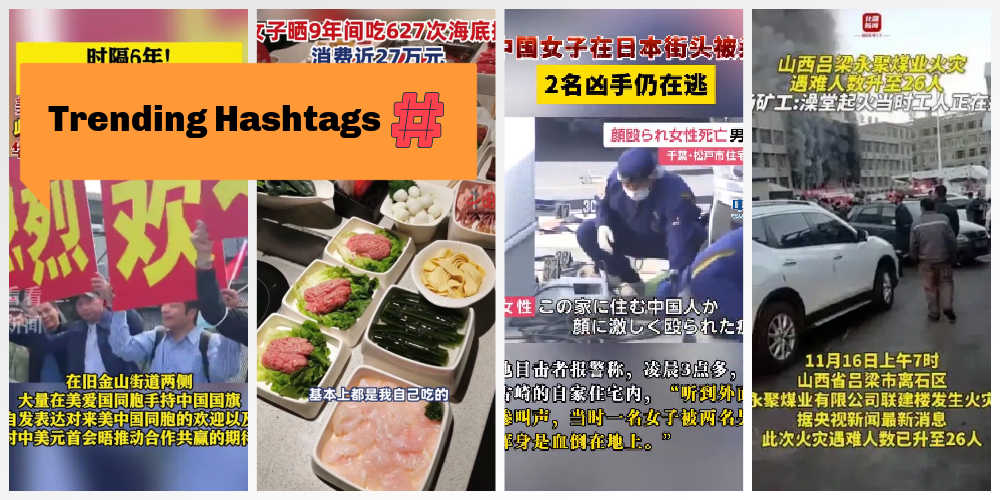
◼︎ 1. TAOBAO CRASHES DURING SINGLE’S DAY SALES | China’s largest online shopping event of the year, Single’s Day, took place on November 11 for the 15th time. Despite concerns over China’s economy, Chinese e-commerce giants Alibaba and JD.com once again saw record sales, although, similar to last year, they did not release their full results. One topic that generated enormous attention on the day itself was Taobao, Alibaba’s e-commerce platform, becoming unreachable before the end of the day, leaving millions of online shoppers clicking and refreshing as the platform kept crashing due to the surge in traffic. (Weibo hashtag “Taobao Down” #淘宝崩了#, 2.6 billion views).
◼︎ 2. SIMBA DOUYIN ACCOUNT BLOCKED | Earlier this month, Chinese famous Kuaishou livestreamer Simba (辛巴, real name Xin Youzhi) became a top trending topic after his Douyin account, where he had over four million followers, was banned. Although the official reason for his suspension was not explicitly stated, it reportedly related to the fact that Simba, among others, had scolded the Douyin platform. Simba, the king of Kuaishou, is known for getting into controversies and arguing with other livestreamers and companies. Now, he can add ‘arguing with platforms’ on his list as well. (Weibo hastag “Simba Douyin Account Banned” #辛巴抖音账号被封禁#, 390 million views).
◼︎ 3. MURDER IN MATSUDO | In the morning of November 9, Japanese police Matsudo discovered a woman covered in blood on the streets of the city’s Kogasaki district. She was later pronounced dead at the hospital. The woman was a 33-year-old Chinese national who reportedly resided in the Japanese city. She was fatally attacked and beaten by two men in the early hours of the morning and was left to die in the streets in a pool of blood. (Weibo hashtag “Chinese Woman Murdered on Streets in Japan” #一中国女子在日本街头被杀害#, 350 million views, read more here)
◼︎ 4. CHINESE CROWDS CHEERING IN SAN FRANCISCO | Apart from the Xi-Biden talks and APEC in general, what caught significant attention on Chinese social media this week was the enthusiastic reception of Xi Jinping by Chinese crowds in San Francisco. On November 14, the day of his arrival in the US, flag-waving crowds gathered along Xi Jinping’s route from the airport to the hotel. Chinese official media actively shared news about their presence, while protests critical of Xi and addressing human rights issues in China went unreported. In contrast, the pro-Palestine protests during APEC did receive media attention, highlighting a media bias in determining which public voices and flag-waving actions were deemed hashtag-worthy and which were silenced. (Weibo hashtag “Crowds of Chinese/Overseas Chinese Form Welcome Crowd in San Francisco,” #华人华侨在旧金山组成欢迎人群#, 170 million views.)
◼︎ 5. CHINESE INTERNET CELEBRITY DROWNS | News about a Chinese national drowning in Bali became top trending on Weibo on November 9 when it was revealed that the 34-year-old man was the popular Chinese influencer Jhony Huang (仲尼), also known as XFJ or Huang Xiaofeng (黄小沣). The tragic incident reportedly occurred when Huang was swept away by waves and struck by a large wooden object while swimming with his wife at Batu Belig Beach during their vacation. His wife, the Ukrainian Karina Melynychuk, was also hospitalized but did not sustain serious injuries. According to local reports, Huang’s lifeless body was discovered floating approximately 100 meters from the Petitenget Beach shoreline. (Weibo hashtag “34-Year-Old Chinese Male Drowns in Bali” #一名34岁中国男性在巴厘岛遇难#, 910 million views; “Jhony Drowns After Hit by a Large Log” #仲尼系遭大木头撞击溺亡#, 140 million views).
◼︎ 6. BIRTH CERTIFICATE SCANDAL | A hospital director and seven staff members are currently being investigated for reportedly selling counterfeit birth certificates for trafficked babies. The controversy emerged when a Chinese anti-human trafficking campaigner posted a video on Douyin, accusing Jianqiao Hospital in Xiangyang (襄阳健桥医院) of fabricating birth certificates and charging approximately 96,000 yuan ($13,165) for them. On social media, netizens expressed shock that such practices are still occurring in 2023, and there was surprise that the case was brought to light by a volunteer rather than being uncovered by authorities (Weibo hashtag “Xiangyang Announcement on Jianqiao Hospital Selling Birth Certificates Problems” #襄阳通报健桥医院贩卖出生证问题#, 27,8 million views).
◼︎ 7. FIRE IN SHANXI | A fire that broke out on the morning of November 16 in a coal firm office building in Lüliang, Shanxi province, claimed the lives of at least 26 people and resulted in 38 injuries. The blaze ignited in the four-story building containing offices and dormitories. The incident adds to a series of safety concerns in China’s coal industry – the building in question is affiliated with the Yongju Coal Group (永聚煤矿), a mayor player in the region’s coal mining sector. By now, 13 people related to the company, including executives, are facing criminal measures for their responsibility in the incident. (Weibo hashtag “Shanxi Yongju Coal Company Fire Claims 26 Lives” #山西永聚煤业火灾已致26人遇难#, 65 million views).
◼︎ 8. WOMAN SPENDS FORTUNE ON HOTPOT | A 32-year-old woman from Nanjing, China, grabbed attention on Weibo this weekend by revealing that she had spent nearly 270,000 yuan (over $37,400) at China’s renowned hotpot chain, Haidilao, in the past nine years. The hotpot enthusiast, named Kong, joined Haidilao as a member in 2014, and in that time, she indulged in over 627 hotpot dinners. Occasionally, her cravings led her to visit the restaurant more than 12 times a week, even enjoying hotpot for breakfast. (Weibo hashtag “32-Year-Old Woman Spent 270k at Haidilao in 9 Years” #32岁女子9年花费近27万吃海底捞#, 150 million views).
What Lies Behind

The Story of Li Jun and Liang Liang
In recent days, the challenges faced by an ordinary young Chinese couple who purchased an unfinished property have sparked extensive discussions on Chinese social media, shedding light on broader trends that lead some young people to seek an escape from the urban struggle and striving for a better everything (better housing, better jobs, better education) – they just want to “lie flat” (躺平) instead.
Last year, the couple, Li Jun (丽君) and Liang Liang (亮亮), first became popular on Chinese social media as they shared their journey of buying a property and building a life in Zhengzhou, Henan Province. They put a deposit on an off-planned apartment, eagerly anticipating its delivery in three years. Excited about their new home, they regularly updated their progress on Douyin, showcasing their savings efforts and monthly visits to the construction site.
However, after eight months, the developer faced financial issues, causing a halt in construction. In later videos, the couple appeared frustrated and disillusioned. Their daughter was born during this time, adding to the financial strain of rent and mortgage payments without a clear timeline for moving into their future home. Many others faced similar challenges. Authorities intervened, promising a delayed delivery. The initial contract included a 20,000 RMB ($2775) rebate for buyers, but the couple faced rejection and insults when demanding payment. In a recent altercation, the husband was beaten by developer personnel, and the wife’s phone was snatched as she tried to record the situation.
Their Douyin videos reflected the emotional rollercoaster of an ordinary Chinese couple facing setbacks despite following the traditional path of education, hard work, marriage, saving, property ownership, and starting a family. They are one of thousands of millions of ordinary Chinese people, who give their best effort despite all the struggles. Many were asking, would their life have been different if they had decided to ‘lie flat’ instead? And who is to blame for the fact that, despite all of their hard work and commitment, their ‘Chinese dream’ is taken away from them?
What’s Noteworthy
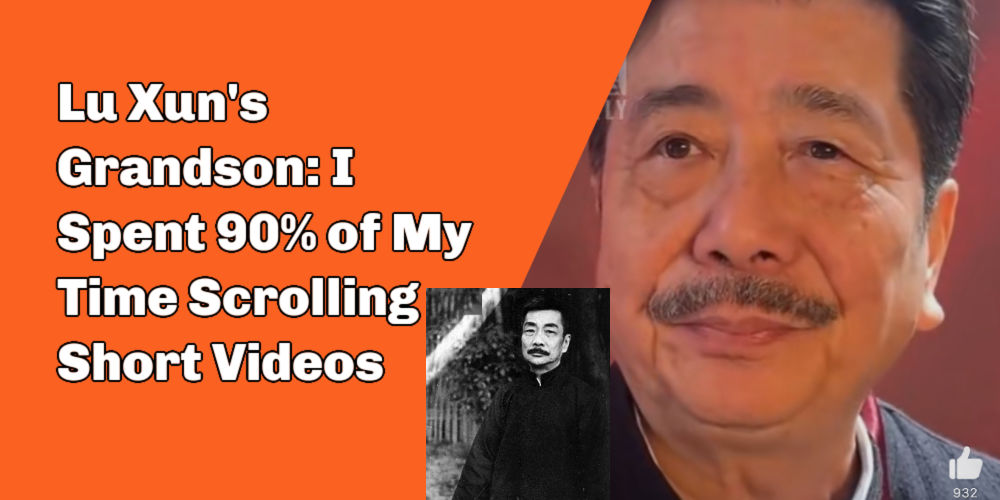
Lu Xun Turning in His Grave? | Lu Xun (魯迅, 1881-1936) stands out as one of China’s most notable and influential authors of the twentieth century. This esteemed Chinese writer, essayist, and literary critic unexpectedly found himself at the center of China’s social media discussions this week following an interview with his grandson, Zhou Lingfei (周令飞), during the Mao Dun Literature Award ceremony (茅盾文学奖) on November 17 in Wuzhen.
During the interview, Lu Xun’s grandson was asked about his online and reading habits. In a light-hearted response, Zhou humorously shared that he spends approximately 90% of his time watching short videos and 10% of his time reading books. A related hashtag (#鲁迅孙子自称90%刷视频10%看书#) went viral on Weibo, amassing over 190 million clicks.
The topic received so much interest due to various reasons. For one, as Lu Xun is widely regarded as the greatest Chinese writer of this century, people would expect his grandson to also be a man of literary knowledge and wisdom – they simply did not expect him to say he scrolls apps like Douyin and Kuaishou on a daily basis. Another reason is that it underscores a broader trend where people spend more and more hours on their phone mindlessly scrolling videos instead of engaging in study and learning. While some criticized Zhou for his comments, others also praised him for being authentic, straightforward and honest, just like his grandpa.
What’s Popular
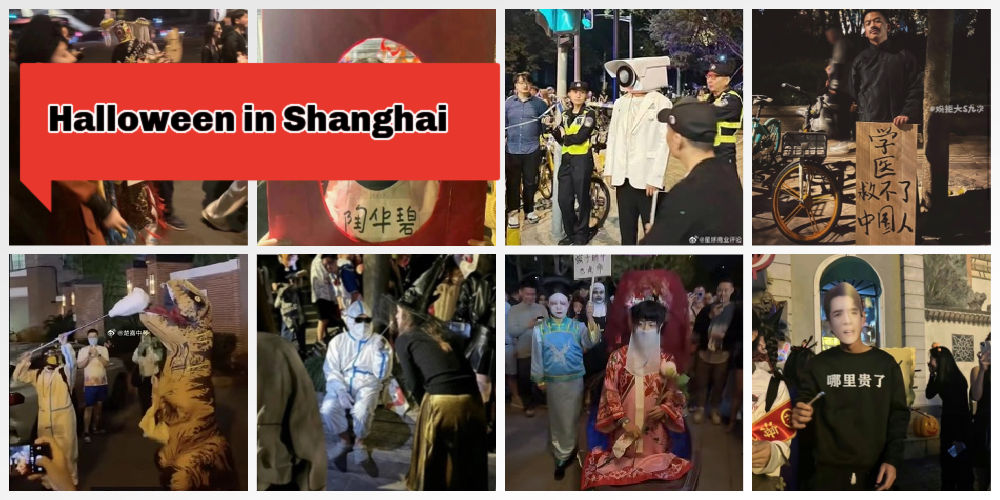
Halloween Outfits Reflecting Social Trends | Since our last newsletter was all about What’s on Weibo’s 10-Year Anniversary, we’d still like to take a moment to reflect on the celebration of Halloween in Shanghai this year as it caused a frenzy on the Internet.
Rather than traditional Halloween themes, young people on Shanghai’s Julu Road brought pop culture memes and social phenomena to life with their creative costumes. You could spot some dressed as the Lipstick King Li Jiaqi, who recently got caught up in controversy, or as “Dabai,” the anti-COVID workers in protective suits. This playful and unconventional celebration received praise from netizens across China.
The debate about whether or not people should be celebrating Western festivals often surfaces on Chinese social media during Halloween. However, the massive street party in Shanghai seemed to silence the critical voices this year. It appears that they reached a consensus; this Halloween celebration isn’t just about a Western festival, it’s an opportunity to let loose and express bottled-up emotions in a spooky and festive atmosphere. Whether dressed as writer Lu Xun making a statement or portraying a mobile surveillance camera, everyone found a haven for unrestrained self-expression. A comment under a photo recreating a scene from “Farewell My Concubine” captured the spirit: “Shanghai’s Halloween party has turned into China’s very own pride walk.”
With recent administrative rules turning Chinese New Year’s Eve into a regular workday, many young people express that they no longer care about a festival’s tradition and simply want to have some fun. One noteworthy viral video from Julu Road featured two guys dressing as legendary singers Feya Wong and Na Ying, performing a classic duet from the 1998 Spring Festival Gala. Netizens dubbed it the young generation’s Spring Festival Gala – a celebration of fun and creativity where happiness is the main focus.
What’s Memorable
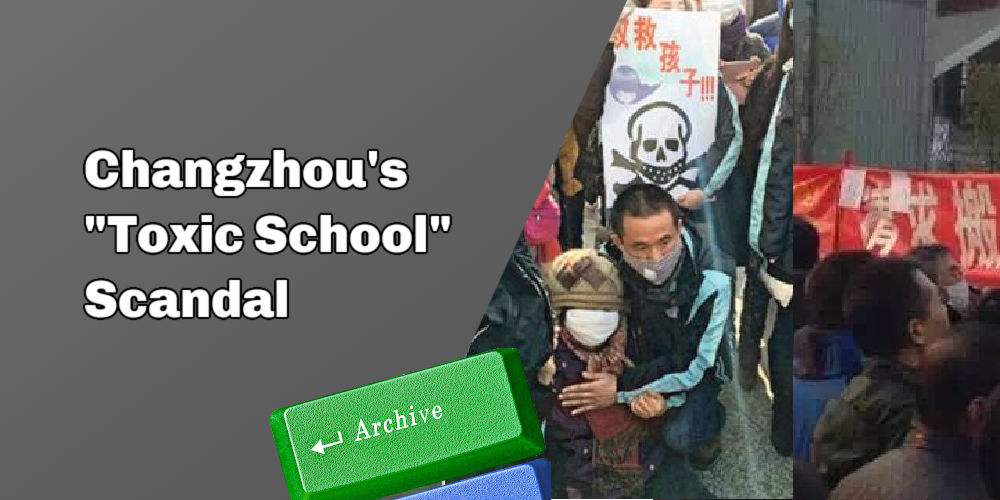
Changzhou Chemical Factory School Scandal | This week’s archival pick revisits a significant incident from eight years ago that fueled public distrust. In 2016, a major controversy unfolded around a middle school in Changzhou, where almost 500 students fell seriously ill, some diagnosed with leukemia. The health issues emerged after the school relocated to a new area near a chemical factory in September 2015.
Upon investigation, it was revealed that air and water pollution from nearby chemical plants was the cause. The news triggered widespread anger and discussions on social media, with netizens questioning the contrasting facts that emerged. The incident brought to light not only broader concerns about environmental safety and public health in China but also underscored a deep-seated distrust between parents and schools, citizens and local authorities, and netizens and official media.
Weibo Word of the Week
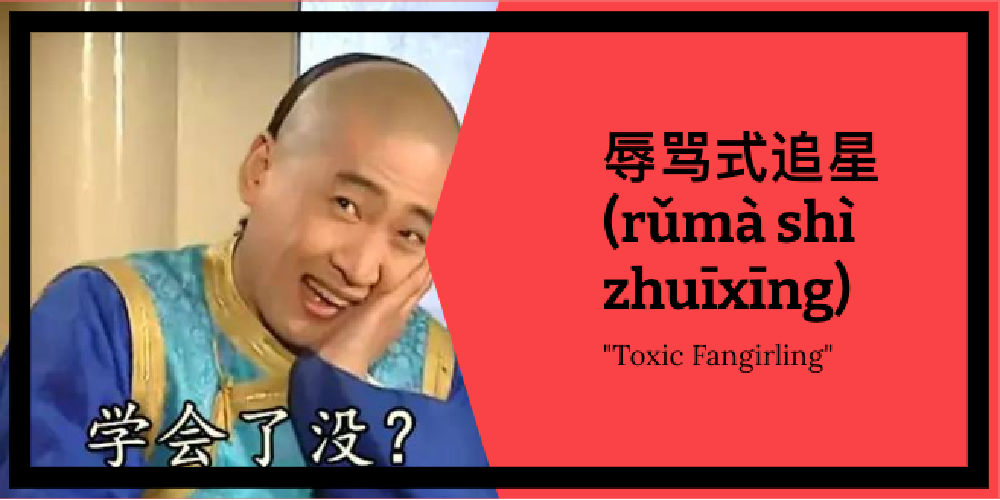
“Toxic Fangirling” | Our Weibo Word of the Week is “辱骂式追星” (rǔmà shì zhuīxīng), which translates to “toxic fangirling” or “toxically rooting for someone.”
In China’s ever-evolving fan culture, the phenomenon of ‘rǔmà shì zhuīxīng‘ (辱骂式追星, lit: ‘abusive-style celebrity admiration’) or toxically fangirling has recently become a trend. This term refers to a rather extreme way for fans to engage with their their idols. When pleased, they express intense love and support for their idols, but they can turn into abusive trolls targeting their idols when dissatisfied. This shift from love to aggression can be triggered by small things, like an unflattering photo or an unsatisfactory performance. Initially viewed as a departure from blind loyalty, this fan behavior has now turned somewhat toxic.
Recently, this term has sparked discussions likening this kind of online behavior to toxic parent-child relationships in Chinese society. The hashtag “Asian parents toxically rooting [for their children]” (#东亚父母辱追#) gained traction on Weibo. A top viral quote joked, ‘My parents toxically root for me every day; as long as they’re paying, they feel they can insult me all they want.’ These discussions touched upon the issue of how many Chinese parents seem to follow a strict and demanding parenting approach, where children need to adhere to high standards and are only praised or acknowledged when high standards are met. If this is not the case, parents will scold or discipline their children in the name of ‘love.’
Netizens interpret this ‘toxic fangirling’ phenomenon half ironically, half seriously, suggesting its origin may be rooted in the collective childhood trauma of Chinese fangirls. Similar to how a dragon-slaying warrior can become an evil dragon, traumatized children may choose to whip their loved ones into what they desire.
This is an on-site version of the Weibo Watch newsletter by What’s on Weibo. Missed last week’s newsletter? Find it here. If you are already subscribed to What’s on Weibo but are not yet receiving this newsletter in your inbox, please contact us directly to let us know.
Stories that are authored by the What's on Weibo Team are the stories that multiple authors contributed to. Please check the names at the end of the articles to see who the authors are.

Also Read
Newsletter
Weibo Watch: China’s Online Feminism Is Everywhere
From ‘Her Story’ to an online campaign highlighting the shortcomings of sanitary pads, China’s online feminism is taking shape in new ways.
Published
2 weeks agoon
December 8, 2024
PREMIUM NEWSLETTER | ISSUE #40
This week’s newsletter:
◼︎ 1. Editor’s Note – China’s Online Feminism Is Everywhere
◼︎ 2. What’s New – A Closer Look at Featured Stories
◼︎ 3. What Else to Know – South Korea and Syria Trending on Weibo
◼︎ 3. What’s Noteworthy – Dutch Woman Searches for Chinese Roots in Anhui
◼︎ 4. What’s Memorable – About the Notre Dame Fire and the Old Summer Palace
◼︎ 5. Weibo Word of the Week – 飘然 (Piāorán)
Dear Reader,
Hello again! After a brief hiatus, I’m happy to reconnect with you all. My time away was spent traveling across China to deliver addresses at the Embassy and Consulate of the Kingdom of the Netherlands. Preparations and travel left less time for the site than anticipated, but it was well worth it. It was an honor to serve as the Cleveringa speaker in both Beijing and Shanghai and to meet so many of you who have been reading and supporting What’s on Weibo.
Cleveringa (1894–1980) was a distinguished Dutch professor and dean of law at Leiden University. In 1940, he gave a historic speech protesting the dismissal of two Jewish colleagues under Nazi policies. His bold act is commemorated annually through Cleveringa Lectures, not only at Leiden University but also at Dutch embassies worldwide. This year, the Cleveringa Lecture series extended to Beijing, where I had the opportunity to contribute to this meaningful tradition.
The topic of my lecture was “Fifteen Years of Weibo: New Voices Shaping Social Power in China,” in which I discussed how Weibo has become much more than just another social media platform. It has turned into a space where state media channels, brands and businesses, everyday citizens, meme creators, and unlikely heroes ignite national conversations and even drive social change. In the lecture, I explored the various stories that went viral and left a lasting impact over the years, further diving into the unique power of Chinese social media to shape public discourse and connect a diverse nation in unprecedented ways.
Meeting many of you—embassy staff, journalists, and students—at these events was a highlight. It’s heartwarming to know What’s on Weibo is a valuable resource to many of you for staying tuned into digital China’s trends.
Clashes and Controversies over Feminism
A recurring topic during discussions was Chinese feminism, especially as the Orange the World campaign began on November 25, marking 16 days of global action against gender-based violence. In honor of this, the Embassy of the Netherlands glowed orange to support #OrangeTheWorld.
One of the major stories I explored in my lecture is also strongly connected to feminism: the Xuzhou chained mother in 2022. This case was a pivotal moment for China’s online feminist movement, spotlighting issues such as human trafficking and the silent complicity of local village or county authorities that allowed such tragedies to unfold. I went on to discuss the evolving nature of online feminism in China.
This topic of online feminism has resurfaced on Weibo multiple times in recent weeks—though not always in a positive light.
In November, Chinese e-commerce giant JD.com canceled its “Singles Day” collaboration with comedian Yang Li following male backlash and boycott threats over her critiques of male confidence. While some celebrated the decision, many women vowed to boycott JD in protest, calling out misogyny and double standards. This incident reflected how anti-feminist sentiments in China not only influence public discourse but also shape business and marketing dynamics.
Over the past two weeks, the Chinese hit film Her Story, directed by young female filmmaker Shao Yihui (邵艺辉) and released on November 22, also triggered online discussions. Some critics labeled it a “boxer film” (拳师电影). As explained in Wendy Huang’s article, in China, the term “boxer” (拳师) is sometimes used to critique certain feminists. The second character in the word for feminists (“权” quán) is pronounced the same as the first character in “boxer” (“拳” quán). This term has therefore become used to mock feminists who are seen as overly aggressive.
These examples—and there are many more recent ones—highlight the negative connotations of ‘feminism’ in China. Not too long ago, the Communist Youth League of China even called “extreme feminism” a “malignant tumor on the Internet.”
Over the past ten years, there have been many discussions on the state of feminism in China today. During this time, feminism has seemingly become an increasingly uncomfortable term.1
“Feminism was never a taboo topic in China,” women’s rights activist Meili Xiao wrote in the New York Times in 2015. She explained: “Before, our messages were consistent with those of the government, which calls itself an advocate of women’s rights.” That sentiment started to change, especially over the past decade, as many women perhaps no longer want what the government wants for them.
In 2018, while the Me Too Movement dominated Western media discourse, various renowned feminist Weibo accounts, including Feminist Voices (女权之声), were pulled offline. In the years that followed, feminist groups were also censored on other platforms, from WeChat to Douban.
In recent years, feminism on the Chinese internet has grown increasingly controversial—not just because of censorship, which ties more to politics and the repression of grassroots activism—but also due to social disagreements over what Chinese feminism is or should be.
It is not uncommon for Chinese feminists of various generations and backgrounds to clash (read about one famous clash here). Some popular online groups of vocal women are sometimes degradingly called “countryside feminists” (中华田园女权), a term used to describe women who label themselves as feminists but cherry-pick the rights they think they should have. Some mainland liberals argue that feminism in China should not focus solely on gender differences but raise voices for broader civil rights activism.
Perhaps most important to realize is that Chinese feminism is not Western feminism. Western feminism, influenced by the sexual revolution and movements like gay liberation, brought forth academic studies on gender and sexuality that were heavily dominated by Western cultures, histories, and voices. These ideas often emphasized resistance against male dominance alongside liberalism and capitalism.2
While there is an ongoing effort in China to adapt and reinterpret Western feminist discourse to align with local cultural realities, many believe that the liberation of women cannot be separated from broader societal emancipation and should transcend the Western binary division of the sexes.
However, some Chinese feminists continue to incorporate Western feminist frameworks to advance feminism in the Chinese context, which often leads to resistance and even online hate from those who view these efforts as ‘disruptive’ or as ‘promoting opposition between the sexes.’
Scattered Revolutions
The insightful work Weibo Feminism: Expression, Activism and Social Media in China (2022) by Xue and Rose explores how Weibo serves as a platform for diverse feminist discourses. These include questioning traditional values like Confucian filial piety, examining the one-child policy, and engaging in broader discussions on reproductive autonomy among feminists from different social, ethnic, and professional backgrounds.

Weibo Feminism by Xue and Rose.
Despite tensions between Western-influenced feminists and those more aligned with communist ideals, Weibo has also allowed for more independent feminist voices to emerge. These voices focus on systemic change and collective solidarity, reinterpreting global feminist ideas to fit China’s unique socio-cultural context.
Facing censorship and pressure, Weibo feminists have adopted decentralized strategies—what Xue and Rose call “scattered revolutions.” Instead of building massive accounts, they create smaller, distributed communities to impact larger debates: “You forbid us to gather anywhere, so we will be everywhere.”
Every now and then, these voices can be heard all over Weibo. Recently, these voices surfaced in online conversations about misleading sanitary pad advertisements, which expanded into broader discussions about women’s health, safety, and rights.
Ruixin Zhang wrote about grassroots efforts to combat menstrual stigma and hold Chinese companies accountable here. Wendy Huang covered the discussions surrounding Her Story here.
There is much more to say about China’s online feminism, a topic that will undoubtedly come up more often in the time to come.
Looking Ahead
For those I didn’t meet but who are interested in the topic of my Cleveringa speech, I’ll dive deeper into Weibo’s 15-year anniversary on What’s on Weibo early 2025. There are also exciting changes coming to the site, allowing for deeper insights into special topics—more on that soon!
If you appreciate What’s on Weibo and want to stay up to date, please continue as a premium member, tell colleagues and friends to subscribe, or explore group accounts for your office (email me for group discounts). To maintain independence, I still don’t do advertisements or sponsorship deals, so your support is what keeps everything going.
Meanwhile, if you’d like to connect on social media for more frequent updates, follow Whatsonweibo on Instagram here or follow my personal account on X. I’ve also recently joined Bluesky, please find me here.
Warm regards,
Manya Koetse
1 FYI: The term ‘feminism’ in itself is a Western term, which is translated in Chinese as 女权主义 (nǚquán zhǔyì), meaning “women’s rights ideology” as the term 女权 (nǚquán) combines 女 (nǚ), meaning “woman,” with 权 (quán), meaning “rights” or “power.” 主义 (zhǔyì) translates to “ideology” or simply “-ism.”
2 More on this: Zhou Huashan (周华山). 2000. Xingbie yuejie zai Zhongguo (性别越界在中国) [Crossing the Borders of Gender in China]. Hong Kong: Xianggang Tongshi Yanjiushi (香港通识研究室), 16–18.
What’s New

Shortcomings in Menstrual Pads | Sanitary pads have never been a bigger topic of debate on Chinese social media as it’s been over the past few weeks. What began with one blogger’s discovery of menstrual pads falling short of their advertised size has grown into a broader movement, demanding better-quality products and greater awareness of menstrual health. Insightful article by Ruixin Zhang 👇

Good Stuff | The Chinese comedy-drama Her Story (好东西, literally “Good Stuff”), directed by Shao Yihui (邵艺辉), has been gaining attention and sparking discussions on Weibo since its late November release in mainland China. Beyond the discussions of plot and central themes, Her Story reflects the increasing success and influence of women filmmakers in the Chinese film industry.

A Caravan of Cyclistst | From city marketing to the spirit of China’s new generation, there are many themes behind the recent Zhengzhou trend of thousands of students cycling to Kaifeng overnight.
What Else to Know

It was a sleepless night in South Korea on December 4 after President Yoon Suk-yeol unexpectedly declared martial law on Tuesday evening. On Weibo, many netizens also stayed awake, closely following the unfolding events in Seoul. Geopolitical events rarely dominate the entire trending topic list on Weibo, but this was such an extraordinary moment for China’s maritime neighbor that it took over the hot lists.
The next day, after the martial-law declaration was lifted, online banter erupted about the South Korean ‘elite’ Special Forces. Netizens were amused by how clumsily they climbed through windows, falling short of expectations shaped by military dramas like Descendants of the Sun, where troops are portrayed as near-superheroes. In contrast, many found opposition leader Lee Jae-myung’s wall-climbing skills to enter parliament far more impressive. (See the online video here).
While South Korea sunk deeper into what’s being called a constitutional crisis, rebels took control of Syria’s capital and President Bashar al-Assad resigned and left Syria on Sunday. Some banter aside, the latest geopolitical upheaval has been attracting a lot of attention on Weibo. Noteworthy enough, Chinese state media even linked the situations in South Korea and Syria under the hashtag “Sorting Out the Changes in the Situations in Syria and South Korea” (#梳理叙利亚和韩国局势变化#).
“Actually, the situations in Syria and South Korea are, in some ways, quite similar,” one Weibo commenter wrote: “Both happened really suddenly, and both cases (will) end with the president stepping down. However, as of now, it seems that the South Korean president will face further accountability, while the Syrian president, if he lands smoothly in Russia, is at least currently in a slightly better position than his South Korean counterpart.”
Despite official media narratives linking the two situations under one headline, most online discussions highlight key differences. The South Korean crisis is largely viewed as the result of a society that, after forty years of transformation, can no longer tolerate a leader infringing on constitutional rights. In contrast, Syria’s upheaval is seen as the product of a political landscape lacking a foundation for democracy, leaving it vulnerable to becoming a mere chess piece in the broader geopolitical game.
What’s Noteworthy

Last week, on the occasion of my lecture at the Consulate of the Kingdom of the Netherlands in Shanghai, I had the pleasure of meeting Fengli Bottema, a bright and determined Dutch woman who was adopted from China and has now returned to her birth country in hopes of finding her biological parents.
Fengli was adopted in 2003 at the age of two when her Dutch parents traveled to the Department of Civil Affairs in Anhui Province to meet her and bring her home to the Netherlands. For the first two years of her life, Fengli was lovingly cared for by a foster family in Hefei—a family with whom both Fengli and her adoptive parents have remained in touch. Grateful for the love and support she received from both her foster and adoptive parents, Fengli is now hoping to complete the puzzle of her family history by reconnecting with her biological parents.
Before resuming her medical studies in Rotterdam this coming January, Fengli is currently taking a semester of language courses at Fudan University in Shanghai. While pursuing her studies, she is also actively searching for more clues about her biological family.
Her search has gained attention on Chinese social media, especially on Douyin (see video) and Weibo (#荷兰23岁女孩到安徽寻根#).
Fengli’s story began on May 23, 2001, when she was found in front of the Cuozhen Police Station (撮镇派出所) in Feidong County, Anhui Province. She was brought to a welfare institute by police staff and placed under care. Based on the condition of her umbilical cord, it was determined that she was a healthy newborn. She also had several distinctive birthmarks on her chest, back, and left upper limb.

Fengli’s story represents the journey of many adoptees from China who hope to connect the dots of their past and learn more about their roots. If you have any information or clues that could help Fengli, she warmly welcomes relevant messages at fengli.bottema@gmail.com.
What’s Memorable

This week marked the grand reopening of the Notre Dame Cathedral in Paris, an event attended by numerous prominent figures and world leaders, including US President-elect Trump and Ukrainian President Zelenskyy. On Weibo, popular comments included phrases such as: “The Notre-Dame Cathedral in Paris can reopen, but our Old Summer Palace (Yuanmingyuan) can never be restored to its former glory.”
In 2019, while people around the globe mourned the devastating fire that destroyed parts of the 800-year-old cathedral, Chinese social media users collectively reflected on a painful chapter of their own history: the burning of the Old Summer Palace in 1860 by Western forces. For this week’s archive pick, we revisit the 2019 response on Weibo to the Notre Dame fire, along with the column we wrote to provide context.
Weibo Word of the Week

Fluttering | Our Weibo word of the week is 飘然 (piāo rán), which has no exact English equivalent but could be translated as “fluttering,” “gracefully drifting,” or “floating in the air.”
This week, the word gained significant attention on Chinese social media after it came to light that it was the favorite word of Taiwanese writer Chiung Yao (琼瑶), who passed away by her own choice on December 4, leaving behind a beautiful and impressive farewell letter.
Chiung Yao, one of China’s most beloved romance novelists, was 86 years old when she departed this world. The hashtag “Chiung Yao Has Passed Away” (#琼瑶去世#) received over 840 million views on Weibo.
Among her many works, Chiung Yao is cherished by many netizens in mainland China as part of their collective memories from the 1980s and 1990s. Some of the most iconic Chinese dramas, such as My Fair Princess (also: Return of the Pearl Princess, 還珠格格), were written by Chiung Yao.
Yao had chosen to “depart gracefully and lightly”, or rather, 飘然 (piāo rán). The character 飘 (piāo) means “waving to and fro” or “fluttering.” The character 然 (rán) signifies “in such a manner” or “like this,” often used to describe a state or condition. Together, 飘然 conveys a sense of effortless fluttering, floating away with ease and grace.
Chiung Yao was found on her sofa at home. The cause of death was determined to be asphyxiation due to carbon monoxide poisoning.
In her farewell letter to loved ones and fans, she wrote the following (my translation):
“To all my dear friends:
Do not cry, do not grieve, and do not feel sad for me. I have already fluttered away [翩然 piānrán] effortlessly.
I love the word “翩然” [piānrán]. It represents flying in the air independently, easily, and freely. Elegantly and gracefully, I have shed the body that gradually caused me pain and have ‘fluttered away,’ transforming into snowflakes flying into the sky.
This was my wish. “Death” [死亡] is a journey everyone must take—it is the final significant event in life. I did not want to leave it to fate, nor did I want to wither away slowly. I wanted to have the final say in this final event.
God has not designed the process of life particularly well. When a person grows old, they have to go through a very painful period of ‘becoming weak, degeneration, illness, hospitalization, treatment, and fatal illness.’ This period, may it be long or short, is a tremendous torment for those who are destined to grow old and die! Worst of all, some may become bedridden, dependent on tubes for survival. I have witnessed such tragedies, and I do not want that kind of “death.”
I am a “spark,” and I have already burned as brightly as I could. Now, before the flame finally dims, I have chosen this way to make a light departure. I have recorded everything I wish to say in my video “When Snowflakes Fall Down” (当雪花飘落) [link]. I hope my friends can watch it a few times to grasp everything I wanted to express.
Friends, do not mourn my death but smile for me! The beauty of life lies in the ability to love, hate, laugh, cry, sing, speak, run, move, be together until death parts us, live freely, despise evil with a passion, and live life boldly. I have experienced all these things in my lifetime! I truly ‘lived’ and did not waste this life.
What I find hardest to let go of are my family and all of you. “Love” is what is tightly bound to my heart, and I am reluctant to part with you. To allow my soul (if humans even have souls) to also ‘flutter away,’ please laugh for me, sing loudly for me, and dance in the breeze for me! My spirit in the heavens will dance together with you!
Farewell, my dearest ones! I am grateful for this life, where I had the chance to meet and know you all.
Take note of the way I died: I was at the final station of my life! For those of you who are still young, never give up on life lightly. Momentary setbacks or blows may be the “training” for a beautiful life. I hope you will be able to endure those, as I did, and live to 86, 87.. years old. When your physical strength fades, then decide how to face death. By then, perhaps they will have found more humane ways to help the elderly “leave joyfully.”
Dear friends, be brave, be the greatest version of yourself. Do not waste your journey through this world! Though this world is not perfect, it is filled with unexpected joys, sorrows, and laughter. Don’t miss out on all the wonders out there for you.
There are a thousand more things to say, but in the end, I wish everyone health, happiness, and a life of freedom and joy.”

This is an on-site version of the Weibo Watch newsletter by What’s on Weibo. Missed last week’s newsletter? Find it here. If you are already subscribed to What’s on Weibo but are not yet receiving this newsletter in your inbox, please contact us directly to let us know.
Featured
Weibo Watch: “Comrade Trump Returns to the Palace”
From stocks to memes, Chinese netizens turn Trump’s win into a blend of playful speculation and some serious debate.
Published
1 month agoon
November 6, 2024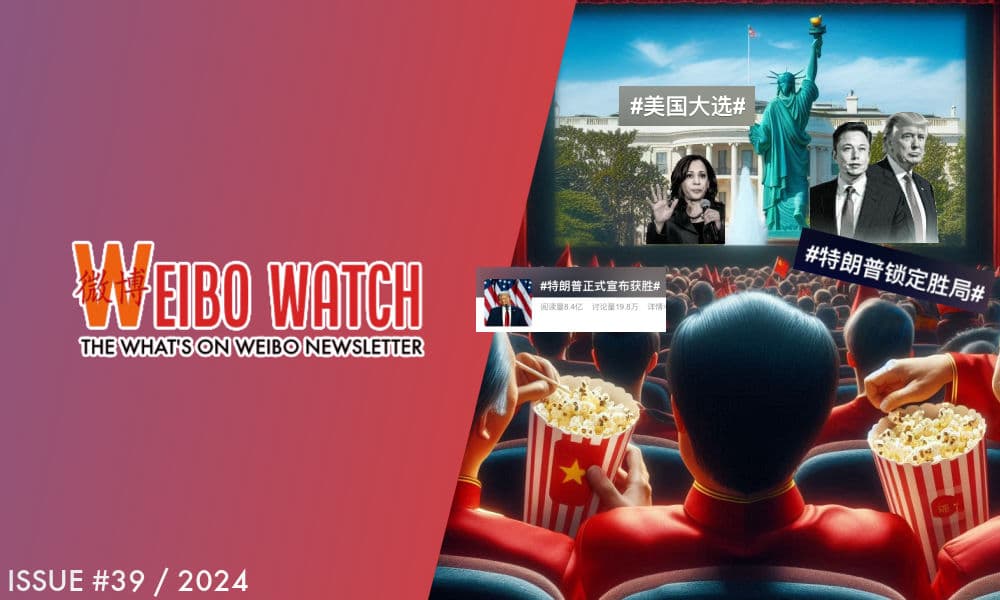
PREMIUM NEWSLETTER | ISSUE #39
This week’s newsletter:
◼︎ 1. Editor’s Note – “Comrade Trump Returns to the Palace”
◼︎ 2. What’s New – A closer look at featured stories
◼︎ 3. WeiboWatch List – Online discussions to watch
◼︎ 4. What’s Noteworthy – Hu Xijin is back
◼︎ 6. What’s Popular – New series features story of Xi’s father
◼︎ 7. What’s Memorable – Trump’s 2016 win
◼︎ 8. Weibo Word of the Week – Digital Ibuprofen
Dear Reader,
“Good morning, everyone. A new day with global impact has begun,” Weibo blogger “MLRS270” wrote early Wednesday morning, China time. Weibo, like the rest of the world, has been closely watching how American voters would shape the outcome of the 2024 US presidential election. With half a million followers, MLRS270 claimed that Harris’s victory was already “set in stone.”
Twelve hours later, however, the online discussions looked very different. Trump’s win dominated Weibo trending topics and the hashtag “Trump Officially Declares Victory” (#特朗普正式宣布获胜#) received over 870 million views.
“The upcoming four years are going to be entertaining,” a popular comment said. Posts, videos, and memes on Trump’s win immediately began to surface, not just on Weibo but also on other Chinese social media platforms like WeChat and Xiaohongshu.
The ‘entertainment’ surrounding the American elections had already started earlier. Most noteworthy was the sudden surge in stock value for a Chinese company called Sichuan Wisdom Co. Ltd. (川大智胜). This spike occurred simply because the company’s name sounds like “Trump winning.”
The Chinese name, Chuān Dà Zhì Shèng (川大智胜), belongs to a software company unrelated to Trump. But its name’s first character, Chuān—which in this context refers to Sichuan—is also used in the Chinese transliteration of Trump’s name, leading some to interpret it as “Trump Grand Wisdom Victory.”
For fun, Chinese investors began buying shares. “To support you, I’ve bought some stocks,” one Weibo user from Sichuan wrote, posting an orange heart emoji. The stocks continued to rise when Trump’s actual win became known (#川大智胜午后涨停#).

Chuān Dà Zhì Shèng (川大智胜) stocks going up.
Meanwhile, another company named Haers (哈尔斯 Hāěrsī), which sounds like Harris in Chinese, saw a sudden drop in its stock. That Zhejiang company, which produces vacuum-insulated containers, also got caught up in the elections (#哈尔斯股价大跌#).

Some Chinese economic news channels noted that “external developments” were clearly playing a role in these market fluctuations, and warned people that this kind of short-term, non-logical speculative trading was not recommended. They suggested it would be better to “enjoy the show from the sidelines” (“看个热闹”).
Nevertheless, the momentary fluctuation in ‘Trump’ versus ‘Harris’ stocks did show a general preference for Trump among the Chinese online public.
While the idea of Trump being a more ‘entertaining’ American president than Harris often comes up in Chinese online discussions on the election outcome, there are also more serious discussions about whether Trump’s presidency would be good or bad for China.
Despite what happened in the past, many netizens suggest that Trump, with his pragmatic and business-oriented mindset, will be “more favorable” for China and “better for global stability.” Despite the downsides of protectionist trade policies and high tariffs on China, it is believed that the potential benefits would outweigh them through, for example, improved diplomatic relations and cooperation in tech. Trump’s view of China as an open economic competitor would allow China to respond directly and strategically.
Harris, on the other hand, is viewed less favorably by Chinese social media commenters who believe that China would be seen as a political adversary under her presidency, employing underhanded tactics to contain and undermine China. In their view, she represents the American political elite, which they perceive as engaging in covert power plays worldwide for political gain. Trump’s explicit focus on economic competition is something many find more relatable.
Her perceived “elitism” is also linked to her calls for the need to “stay woke,” a message that hasn’t resonated with many Chinese netizens, who often associate “wokism” with political elites and Western hypocrisy. In contrast, many prefer to support the more practical and relatable “grassroots.”
However, many also believe that for China, it does not matter who won in the end. “In reality, whoever takes office brings new challenges,” a well-known military and current affairs blogger (@后沙月光本尊) wrote. This sentiment was echoed by many others. When Iraqi Weibo blogger Omar (@欧玛omar) suggested that Trump’s return to power would be unfavorable for China due to his “wild schemes against China” and his “crude remarks,” dozens of commenters replied: “It would’ve been the same either way.” “The Democrats are no different.” “China is not afraid.”
A general consensus seems to be that, if it makes no difference to them who’s in the White House, it might as well be someone they find amusing and interesting. In this regard, Trump is the preferred winner for many netizens, who congratulate “the King of Understanding” for his “reemployment.”

Chinese meme: “Trump returns to the palace.”
Trump earned the title “King of Understanding” (dǒngwáng 懂王, also ‘King of Knowing’) on Chinese social media for his often-quoted claims of understanding complex issues better than anyone else (“people are really surprised I understand this stuff”). (Harris, by the way, was nicknamed ‘Sister Haha’ (哈哈姐) or the “King of Laughter” (笑王) for her frequent, distinctive laughter during public appearances.)
Another famous nickname for Trump is “Comrade Jianguo” (建国同志), meaning “Comrade Build-the-Country.” This nickname humorously suggests that Trump’s leadership, which is meant to “make America great again,” inadvertently accelerates China’s rise. Over the years, these playful nicknames have blended mockery with affection, reflecting the humorous perspective many Chinese social media users have toward Trump’s antics.
While Western platforms like Reddit are filled with shock and dread today, Weibo is mostly buzzing with lighthearted banter and optimism. “Looking ahead, keep an eye on sectors like artificial intelligence, autonomous driving, fintech, and Musk-related stocks,” one commenter wrote. “Trump loves Elon. We might even see peace between Russia and Ukraine, or Kim Jong-un watching an NBA game with Trump. And of course, we’d welcome Comrade Jianguo to visit Hainan for some tourism—after all, he loves doing business, and we have free trade.”
When blogger Wu Pei (@吴佩) asked netizens what Trump’s win would realistically mean for them, responses ranged from “crashing stock markets” and “setbacks for EV companies” to “heightened trade frictions.” The only thing people seem to agree on is that it would be best to sit back and watch the spectacle as “Comrade Trump returns to the palace.”
This edition of Weibo Watch was co-curated by Miranda Barnes. Wendy Huang contributed an insightful article on the recent controversies surrounding Chinese livestream stars, and Ruixin Zhang provides a must-read piece on the ongoing crackdown on online smut.
Best,
Manya Koetse
(@manyapan)
What’s New

Forbidden Stories | A recent crackdown on Chinese authors writing erotic webnovels has sparked increased online conversations about the Haitang Literature ‘Flower Market’ subculture, the challenges faced by prominent online smut writers, and the evolving regulations surrounding digital erotica in China. But how serious is the ‘crime’ of writing explicit fiction China today?

Viral Bao’an | This is the video that made a Xiaoxitian (Shanxi) security guard go viral in China. In the popular video, he tells a Douyin vlogger about his raise from 1,700 yuan/month (US$240) to 2,200 yuan ($310), thanks to a tourism boom driven by the popular game Black Myth: Wukong. Shortly after gaining online fame, he shared in another video that he’d been dismissed, looking tired and saying, “They [the superiors] told me not to work anymore. I didn’t say anything wrong, but they don’t want me to continue.” This sparked a wave of outrage online. More about that here 👇.

Livestream Scandals | As livestreaming continues to gain popularity in China, so do the controversies surrounding the industry. Negative headlines involving high-profile livestreamers, as well as aspiring influencers hoping to make it big, frequently dominate Weibo’s trending topics. ‘Wanghong’ used to be a mark of online fame, but now, it’s increasingly tied to controversy and scandal. Read this deep dive ➡️
WeiboWatch List
🚫 Forbidden Fashion
A group of foreign fashion designers linked to the brand Fecal Matter were denied entry to Beijing’s Forbidden City on October 15. The group, consisting of American designer Rick Owens, his wife Michèle Lamy, and Fecal Matter members Hannah Rose Dalton and Steven Raj Bhaskaran, made headlines internationally after posting photos on social media of themselves posing outside the Forbidden City. According to their post, security had informed them that they could enter if they removed their makeup and changed into “normal” clothing, a request they declined. While the designers framed the incident as motivation to continue fighting for “greater acceptance and tolerance for difference around the world,” Chinese media and social media users viewed it as a sign of disrespect (#外国游客因着装问题被劝离故宫#).

The Forbidden City issued a statement on the 18th, clarifying that it has no specific dress code for visitors, “as long as it’s not too exaggerated.” A top comment on a Weibo thread about the incident, which received over 100,000 likes, read: “When in Rome, do as the Romans do (客随主便, kè suí zhǔ biàn). If you insist on your freedom to dress as you please, then don’t come to my house!”
👻 Halloween Crackdown
The Forbidden City incident wasn’t the only costume-related controversy in China this month. In Shanghai, local police patrolled popular areas to monitor Halloween celebrations. Although there was no nationwide or citywide ban, some videos showed costumed individuals being escorted away by police or forced to remove their outfits. There was a significant police presence on Julu Road and in Zhongshan Park, with the latter even temporarily closed to prevent large gatherings.
Last year, Halloween celebrations in Shanghai caused a frenzy on the Internet. Instead of traditional Halloween themes, young people on Julu Road and beyond brought pop culture memes and social commentary to life through creative costumes. Many outfits were playful, some queer, and others served as social critiques, with costumes depicting surveillance cameras and COVID-19 medical workers. Some even described the event as “China’s very own pride walk.” However, it’s now clear that local authorities are keen to prevent Shanghai’s Halloween festivities from evolving into a larger cultural celebration or protest.
📉 Math Competition Outcome
You might remember the story that went viral earlier this year about Jiang Ping (姜萍), the seventeen-year-old vocational school student who reached the top 12 on the finalist list of the Alibaba Global Mathematics Competition, competing against students from elite universities worldwide. Her success story—coming from a humble rural family and excelling in math as a fashion student under the guidance of her teacher Wang Runqiu (王润秋)—initially resonated but was soon questioned. Critics doubted the authenticity of Jiang Ping’s initial score, not only because she wasn’t a math major but also because her score allegedly surpassed her own teacher’s.
Now, the results of the 2024 Alibaba Mathematics Competition, originally set for August, are finally out. Neither Jiang Ping nor her teacher appears on the list. The competition committee released a statement confirming that Wang Runqiu had assisted Jiang Ping in the preliminaries, violating the “no collaboration with others” rule. It’s a disappointing outcome—not only because the competition allowed room for cheating, which Wang and Jiang exploited, but also because Jiang had become an inspirational role model for many math-loving girls from non-elite backgrounds. Now, she has fallen from that pedestal.
🔪 Xiaomi SU7 Stabbing Incident
A 23-year-old man from Nantong named Kang, who had just purchased the Tesla competitor Xiaomi SU7, recently became a trending topic on Chinese social media after fatally stabbing a biker enthusiast. Kang, who was part of a motorcycling chat group, shared his new 300,000-yuan ($42,200) Xiaomi SU7 EV in the group, only to be mocked by some members. When the Xiaomi EV owner and bikers later met in person outside a coffee shop popular with bikers, the encounter escalated. Kang pulled out a knife, fatally stabbing one of the group members, then fled in his brand-new car, crashing through a storefront and ramming into motorcycles. A video of the incident went viral online. Kang was arrested shortly afterward.

The incident sparked conversations about how the 23-year-old, a recent university graduate, reached this breaking point. A popular blogger, @黑哥爆料, suggested that Kang’s parents had supported him in buying the costly car, hoping he would work hard and settle down. Lacking the social recognition he had hoped for, the situation with the bikers pushed him to his limits. While Kang bears responsibility for his actions, the blogger suggests that the group could have de-escalated the tension by acknowledging him instead of bullying him. In the end, this incident has devastated multiple lives, including the victim’s, Kang’s, and also Kang’s parents, who now bear the financial and emotional toll of their son’s actions.
🍰 Swiss Roll Conversations
“How to divide 8 Swiss rolls?” (8个瑞士卷怎么分?) This question recently became a trending topic on Weibo after a stay-at-home mom shared a video about her experience buying a box of Swiss rolls with eight pieces. Her daughter ate two, her son ate two, and her husband ate two. She assumed the last two pieces were hers, but her husband scolded her, saying she should set a good example by not snacking, and that it was selfish not to save the last pieces for the kids.
The video sparked widespread debate, quickly becoming a symbol for broader issues like gender relations, the division of household labor, and the role of stay-at-home moms. Some feminists expressed outrage over the incident, while others suspected the video was staged to create controversy and attract views. The incident has now drawn so much attention that cyberspace authorities have intervened to investigate whether the Swiss Roll story is genuine. Bon appétit? Let’s see how this unfolds.
What’s Noteworthy

For nearly 100 days, since July 27, the well-known social and political commentator Hu Xijin (胡锡进) remained silent on Chinese social media. This was highly unusual for the columnist and former Global Times editor, who typically posts multiple Weibo updates daily, along with regular updates on his X account and video commentaries.
Various foreign media outlets speculated that his silence might be related to his comments about the Third Plenum and Chinese economics, especially regarding China’s shift to treating public and private enterprises equally. Without any official statement, Chinese netizens were left guessing about his whereabouts. Most assumed he had, in some way, taken a ‘wrong’ stance in his commentary on the economy and stock market, or perhaps on politically sensitive topics like the Suzhou stabbing of a Japanese student, which led to his being sidelined for a while.
On October 31, Hu suddenly reappeared on Weibo with a post praising the newly opened Chaobai River Bridge, which connects Beijing to Dachang in Hebei—where Hu owns a home—significantly reducing travel time and making the more affordable Dachang area attractive to people from Beijing. The post received over 9,000 comments and 25,000 likes, with many welcoming back the old journalist. “You’re back!” and “Old Hu, I didn’t see you on Weibo for so long. Although I regularly curse your posts, I missed you,” were among the replies.
Not everyone, however, is thrilled to see his return. Blogger Bad Potato (@一个坏土豆) criticized Hu, claiming that with his frequent posts and shifting views, he likes to jump on trends and gauge public opinion—but is actually not very skilled at it, which allegedly contributes to a toxic online environment. Other bloggers also take issue with Hu’s tendency to contrast himself, or disagree with the stances he makes in new posts.
When Hu wrote about Trump’s win, the top comment read: “Old Trump is back, just like you!”

Hu seems delighted to be back. He hasn’t mentioned his absence but shared a photo from 1978, when he joined the military, reflecting on his journey of growth, learning, and commitment to the country. He has a way of admiring himself—and, occasionally, we don’t mind admiring him too. Welcome back, Hu.
What’s Popular

The TV series Years in the Northwest (西北岁月), premiering on CCTV 1 this week, tells the story of Xi Jinping’s father, longtime PLA leader Xi Zhongxun (习仲勋, 1913-2002). This is the first historical drama to focus on Xi Zhongxun, highlighting his “extraordinary experiences and achievements” during the 25 years he spent in the Shaanxi-Gansu border region from 1927 to 1952.
Xi Zhongxun joined the Communist Party in 1928 and went on to become a prominent revolutionary and political leader. In the northwest’s Shaanxi-Gansu border region, he played a critical role in establishing revolutionary bases. Working alongside notable figures like Peng Dehuai (彭德怀), his efforts were instrumental in consolidating Party influence in the region.
On social media, some viewers of the first episode have shared emotional responses, while others praise popular actor Wu Lei (吴磊, 1999) for his portrayal of the young Xi Zhongxun.

One interesting aspect of the series’ announcement on Weibo is the unusually high number of shares—over 620,500—compared to the relatively low number of comments, suggesting that online discussions surrounding the series are controlled and contained.
What’s Memorable

On the morning of November 9, 2016 (Beijing time), the world received news of Donald Trump’s victory in the U.S. presidential election. In our coverage of Trump’s win at the time, we provided insight into Chinese reactions to America’s unconventional new president. From official Chinese media to Weibo netizens, responses to Trump’s triumph were favorable, critical, humorous, but above all, mixed.
Weibo Word of the Week

Digital Iboprofen | Our Weibo word of the week is 电子布洛芬 (diànzǐ bùluòfēn), which translates to “Digital Ibuprofen” or “Electronic Ibuprofen.”*
This week, the term came up when fans told Chinese actor and singer Tan Jianci (檀健次) that he is their “digital ibuprofen.” Tan, with a puzzled look, asked what that meant. A fan explained, “It means we feel better when we see you” (or, essentially, “our bodies feel no pain”). Since then, Tan Jianci has become associated with the term “digital ibuprofen.”
Although the phrase resurfaced this week, it has been around for some time, gaining popularity in 2022-2023 among fans of entertainment shows. It refers to content that provides relief from stress or discomfort, much like how ibuprofen alleviates physical pain. For instance, the Hunan TV show Go for Happiness (快乐再出发) is often called “digital ibuprofen.”

Chiikawa is the original ‘digital ibuprofen’. Image via @南岛客厅.
The term saw a surge in popularity alongside the Japanese animated series Chiikawa, which became a viral hit among young people. The anime’s portrayal of its cute character staying optimistic despite life’s stresses earned Chiikawa the nickname “digital ibuprofen,” as fans found comfort in its stories (read more in this story by Sixth Tone).
“Digital ibuprofen” applies to more than just shows—it can be any content, such as videos, memes, or idols, that provides comfort, distraction, and relief to fans.
In the same category, there’s also “digital pickled mustard” or “electronic pickled mustard” (电子榨菜, diànzǐ zhàcài), which refers to a binge-worthy or comforting show.
*The term 电子 (diànzǐ) means “electronic” and is commonly used in modern Chinese terms, much like the English “e-” prefix in ebook (电子书) or email (电子邮件). It’s also used for digital transactions, like digital payments (电子支付) or digital wallets (电子钱包).
Featured image of Tan Jianci’s head inside an ibuprofen pill, on Xiaohongshu via 燋糖栗子.
This is an on-site version of the Weibo Watch newsletter by What’s on Weibo. Missed last week’s newsletter? Find it here. If you are already subscribed to What’s on Weibo but are not yet receiving this newsletter in your inbox, please contact us directly to let us know.
Popular Reads
-

 China Insight7 months ago
China Insight7 months agoThe Tragic Story of “Fat Cat”: How a Chinese Gamer’s Suicide Went Viral
-

 China Music9 months ago
China Music9 months agoThe Chinese Viral TikTok Song Explained (No, It’s Not About Samsung)
-

 China Insight10 months ago
China Insight10 months agoThe ‘Two Sessions’ Suggestions: Six Proposals Raising Online Discussions
-

 China Digital7 months ago
China Digital7 months agoChina’s 2024 Gaokao Triggers Online Discussions on AI






